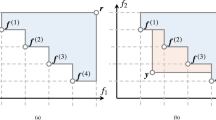Abstract
Hypervolume indicator is a commonly accepted quality measure for comparing Pareto approximation set generated by multi-objective optimizers. The best known algorithm to calculate it for n points in d-dimensional space has a run time of O(n d/2) with special data structures. This paper presents a recursive, vertex-splitting algorithm for calculating the hypervolume indicator of a set of n non-comparable points in d > 2 dimensions. It splits out multiple children hyper-cuboids which can not be dominated by a splitting reference point. In special, the splitting reference point is carefully chosen to minimize the number of vertices of the child hyper-cuboid. The complexity analysis shows that the proposed algorithm achieves \(O((\frac{d}{2})^n)\) time and O(dn 2) space complexity in the worst case.
Access this chapter
Tax calculation will be finalised at checkout
Purchases are for personal use only
Preview
Unable to display preview. Download preview PDF.
Similar content being viewed by others
References
Fleischer, M.: The Measure of Pareto Optima. In: Fonseca, C.M., Fleming, P.J., Zitzler, E., Deb, K., Thiele, L. (eds.) EMO 2003. LNCS, vol. 2632, pp. 519–533. Springer, Heidelberg (2003)
Zitzler, E., Thiele, L., Laumanns, M., Fonseca, C.M., da Fonseca, V.G.: Performance Assessment of Multiobjective Optimizers: An Analysis and Review. IEEE Transactions on Evolutionary Computation 7(2), 117–132 (2003)
Zitzler, E., Thiele, L.: Multiobjective Optimization Using Evolutionary Algorithms — A Comparative Study. In: Eiben, A.E. (ed.) Parallel Problem Solving from Nature V, pp. 292–301. Springer, Amsterdam (1998)
Zitzler, E., Thiele, L.: Multiobjective Evolutionary Algorithms: A Comparative Case Study and the Strength Pareto Approach. IEEE Transactions on Evolutionary Computation 3(4), 257–271 (1999)
Zitzler, E., Brockhoff, D., Thiele, L.: The Hypervolume Indicator Revisited: On The Design of Pareto-Compliant Indicators Via Weighted Integration. In: Obayashi, S., Deb, K., Poloni, C., Hiroyasu, T., Murata, T. (eds.) EMO 2007. LNCS, vol. 4403, pp. 862–876. Springer, Heidelberg (2007)
While, L., Bradstreet, L., Barone, L., Hingston, P.: Heuristics for Optimising the Calculation of Hypervolume for Multi-objective Optimisation Problems. In: The 2005 IEEE Congress on Evolutionary Computation vol. 3, pp. 2225–2232 (2005)
While, L., Hingston, P., Barone, L., Huband, S.: A faster algorithm for calculating hypervolume. IEEE Transactions on Evolutionary Computation 10(1), pp. 29–38 (2006)
Fonseca, C.M., Paquete, L., nez, M.L.I.: An Improved Dimension-Sweep Algorithm for the Hypervolume Indicator. In: IEEE Congress on Evolutionary Computation (CEC 2006), pp. 1157–1163 (2006)
Beume, N., Rudolph, G.: Faster S-Metric Calculation by Considering Dominated Hypervolume as Klee’s Measure Problem. In: Kovalerchuk, B. (ed.) Proceedings of the Second IASTED Conference on Computational Intelligence, pp. 231–236. ACTA Press, Anaheim (2006)
Edelsbrunner, H., Overmars, M.H.: Batched dynamic solutions to decomposable searching problems. Journal of Algorithms 6(4), 515–542 (1985)
Overmars, M.H., Yap, C.K.: New upper bounds in Klee’s measure problem. SIAM Journal on Computing 20(6), 1034–1045 (1991)
Fredman, M.L., Weide, B.: The complexity of computing the measure of ∪ [a i ,b i ]. Communications of ACM 21, 540–544 (1978)
Author information
Authors and Affiliations
Editor information
Rights and permissions
Copyright information
© 2007 Springer-Verlag Berlin Heidelberg
About this paper
Cite this paper
Yang, Q., Ding, S. (2007). Novel Algorithm to Calculate Hypervolume Indicator of Pareto Approximation Set. In: Huang, DS., Heutte, L., Loog, M. (eds) Advanced Intelligent Computing Theories and Applications. With Aspects of Contemporary Intelligent Computing Techniques. ICIC 2007. Communications in Computer and Information Science, vol 2. Springer, Berlin, Heidelberg. https://doi.org/10.1007/978-3-540-74282-1_27
Download citation
DOI: https://doi.org/10.1007/978-3-540-74282-1_27
Publisher Name: Springer, Berlin, Heidelberg
Print ISBN: 978-3-540-74281-4
Online ISBN: 978-3-540-74282-1
eBook Packages: Computer ScienceComputer Science (R0)




